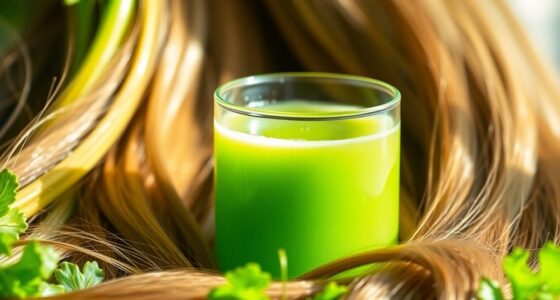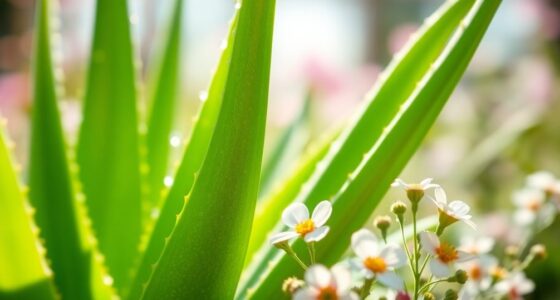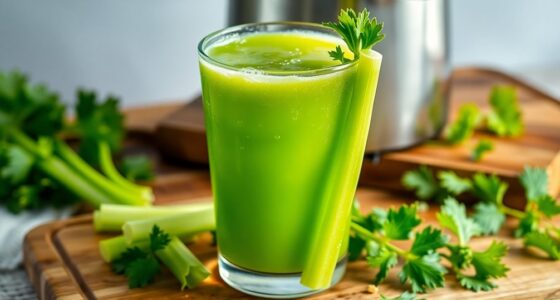Aloe vera is an ancient healing plant, celebrated for its impressive health benefits and versatility. Often called the "plant of immortality," it's been used for beauty and wellness since Egyptian times. It's known to soothe digestive issues, hydrate skin, and accelerate wound healing. Plus, it boasts over 200 components, providing nutritional and medicinal properties. Curious about how to grow your own or the best products to buy? There's so much more you can discover!
Key Takeaways
- Aloe vera, known as the "plant of immortality," has been used for beauty and healing since ancient Egyptian times.
- This succulent plant offers numerous health benefits, including promoting digestive health and regulating blood sugar levels.
- Aloe vera is renowned for its wound healing properties, accelerating burn recovery and enhancing tissue regeneration.
- The plant thrives in warm, sunny conditions and requires well-draining soil with infrequent watering.
- Aloe vera is rich in vitamins and active compounds, making it useful in cosmetics, health foods, and potential medicinal applications.
The Historical Significance of Aloe Vera
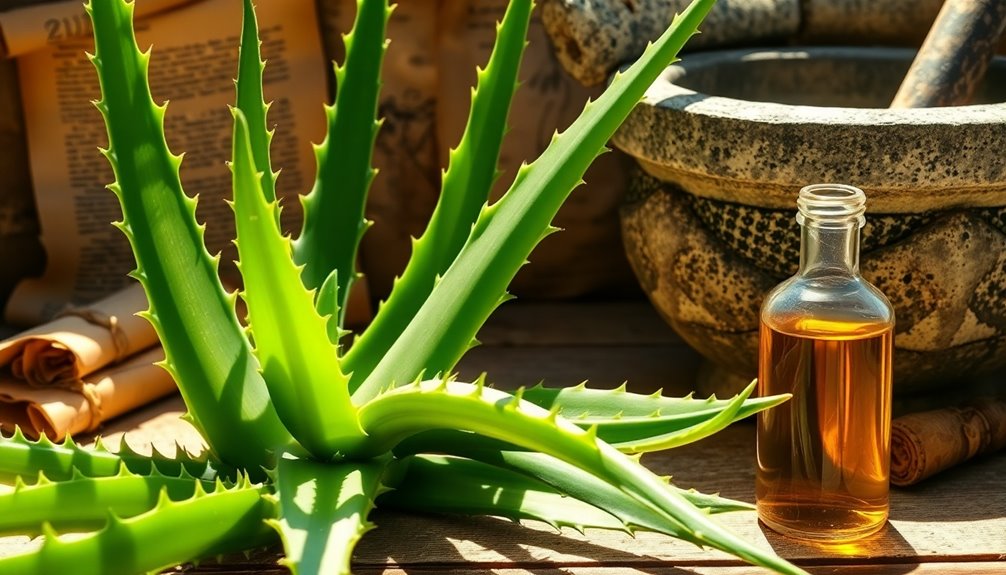
Aloe vera has captivated cultures for thousands of years, becoming a symbol of beauty and health. In ancient Egypt, it was revered as the "plant of immortality," with Cleopatra famously using it to enhance her beauty.
This medicinal plant boasts remarkable healing properties, which ancient Egyptians documented alongside other cultures like the Sumerians and Greeks. They recognized its value, incorporating aloe vera into their practices, including embalming, where it helped prevent decomposition and preserve bodies for the afterlife.
By the 15th century, Spanish Jesuit priests introduced aloe vera to the Americas, further embedding its significance in folk remedies.
Throughout history, aloe vera's legendary status reflects humanity's enduring quest for health and longevity across various civilizations.
Health Benefits of Aloe Vera
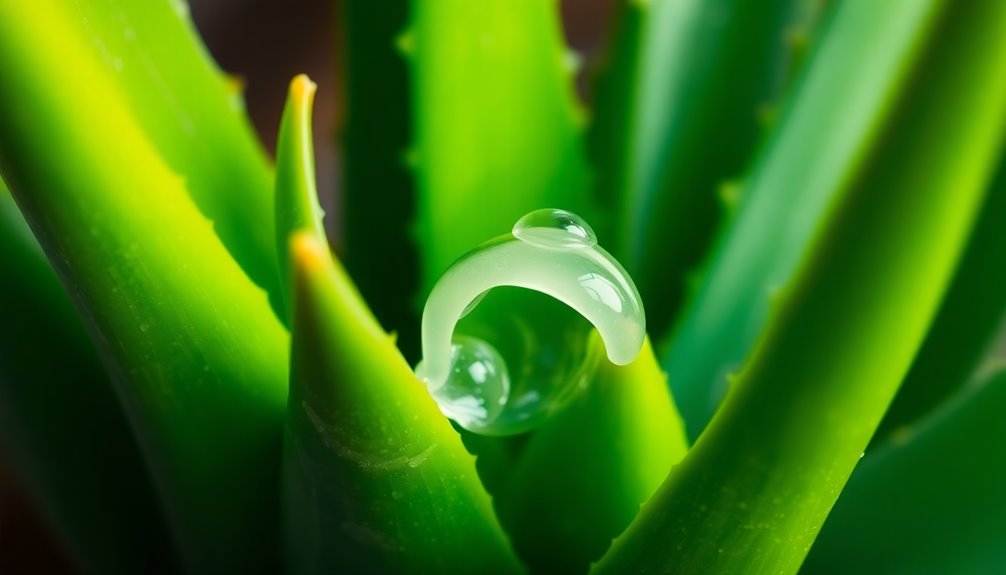
Aloe vera offers impressive health benefits that can enhance your daily life.
It supports digestive health, helps regulate blood sugar levels, and keeps your skin hydrated.
Incorporating this versatile plant into your routine could lead to noticeable improvements in your overall well-being.
Digestive Health Support
When it comes to digestive health support, incorporating aloe vera into your routine can offer notable benefits.
Aloe vera gel is known for soothing digestive issues and reducing gut inflammation, making it a gentle remedy with low toxicity. If you're dealing with gastroesophageal reflux disease (GERD), consuming 1 to 3 ounces during mealtime may lessen its severity.
Its laxative properties can relieve constipation, though moderation is key due to safety concerns. Additionally, studies show that two tablespoons of aloe vera juice daily can lower blood sugar levels in type 2 diabetes patients, supporting metabolic health.
The polysaccharides in aloe vera can also enhance your immune response, contributing to overall digestive health and well-being. Aloe vera has also been used traditionally for its ability to support hydration, which is crucial for maintaining a healthy digestive system.
Skin Hydration Benefits
While many seek effective ways to keep their skin hydrated, aloe vera stands out as a powerful natural solution. Composed of 98.5%–99.5% water, this remarkable plant serves as an excellent hydrator, helping maintain moisture levels in your skin.
Whether you have dry or oily skin, aloe vera's moisturizing properties work wonders. Packed with vitamins A, C, and E, it nourishes and protects your skin while enhancing its health benefits.
Its soothing effect alleviates pain from minor burns and cuts, promoting healing and hydration. Additionally, aloe vera acts as a natural exfoliant, stimulating collagen production and improving skin elasticity. Incorporating aloe vera into your skin products can lead to a healthier, more hydrated appearance you'll love. Moreover, essential oils can be blended with aloe vera for enhanced skin benefits.
Blood Sugar Regulation
Maintaining overall health often involves more than just skincare; it can also mean managing your blood sugar levels effectively. Aloe vera has shown promise in this area, particularly for those with type 2 diabetes.
Studies indicate that ingesting two tablespoons of aloe vera juice daily can lower blood glucose levels and improve insulin sensitivity. This medicinal plant influences key signaling pathways, aiding in glucose and lipid metabolism.
A meta-analysis revealed significant reductions in fasting blood glucose and glycosylated hemoglobin (HbA1c) levels with aloe vera supplementation. However, if you're on glucose-lowering medications, be cautious, as aloe vera can lead to dangerously low blood sugar levels.
Regular consumption may serve as a helpful adjunct therapy, but further research is needed to understand its full potential.
Ideal Growing Conditions for Aloe Vera
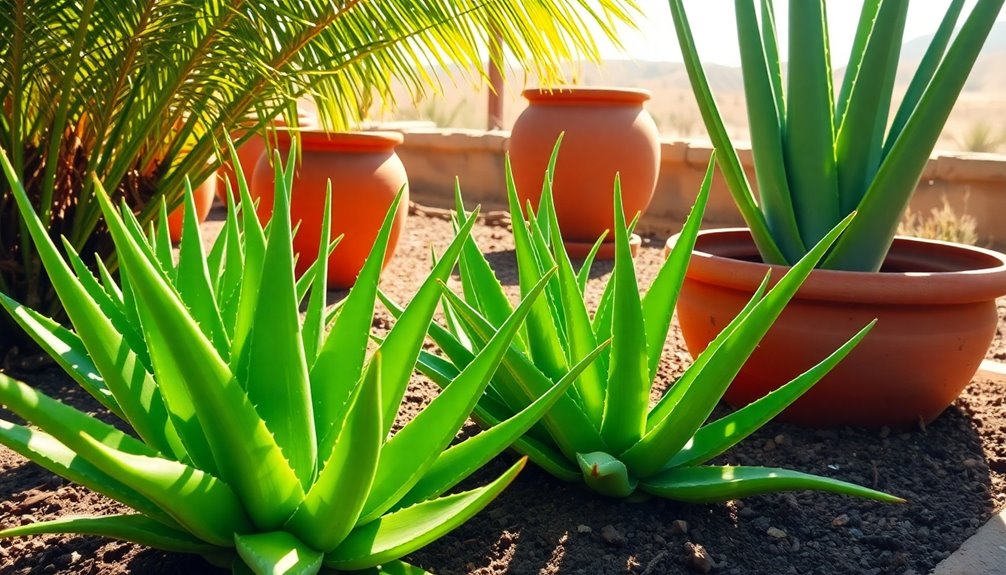
Aloe vera flourishes best under specific conditions that cater to its natural habitat. This succulent plant thrives in warm temperatures, ideally between 55 to 85 degrees Fahrenheit.
You should place it in a location where it can soak up at least six hours of sunlight each day to maximize growth. For peak health, use well-draining soil, such as potting mixes designed for succulents or cacti.
Remember to water infrequently, about every two weeks, allowing the soil to dry completely between waterings to prevent root rot. Be mindful of colder months, as temperatures below 50 degrees Fahrenheit can stress your aloe vera, causing its leaves to turn yellow.
Embrace these conditions to keep your aloe thriving!
Modern Applications of Aloe Vera

As you explore the diverse modern applications of aloe vera, you'll discover its remarkable versatility across various industries. From cosmetics to health food, aloe vera is making waves.
| Industry | Application |
|---|---|
| Cosmetic | Moisturizing gels and creams |
| Health Food | Beverages and supplements |
| Food Preservation | Natural preservative |
| Oral Health | Plaque-reducing mouthwash |
| Medicinal Research | Potential cancer therapies |
Aloe gel is a key ingredient in skincare, while the health food industry uses aloe extract to help lower blood sugar levels. Additionally, studies show aloe gel can extend the shelf life of produce by blocking harmful bacteria. With ongoing research, the medicinal purposes of aloe vera continue to expand.
Nutritional and Bioactive Components of Aloe Vera
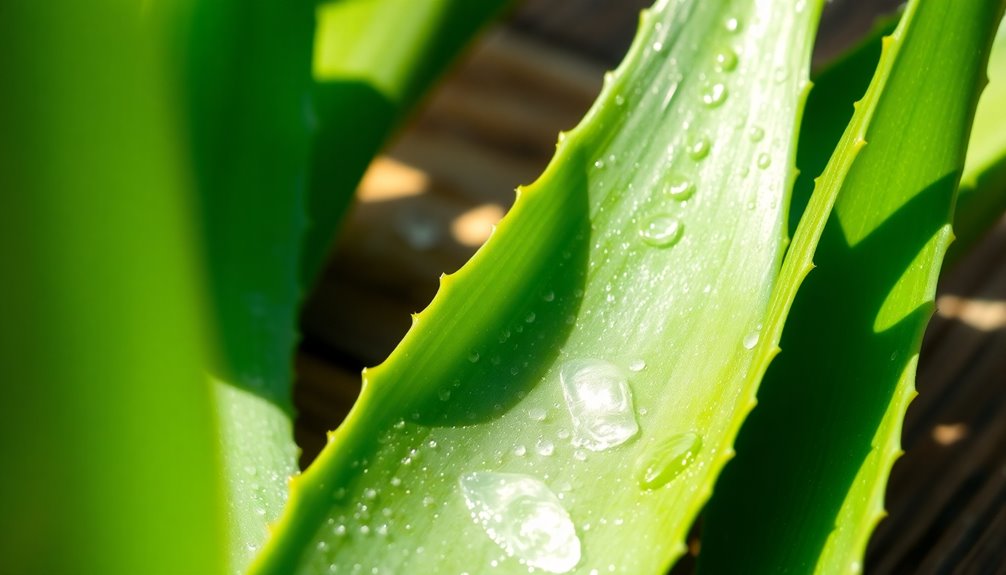
The impressive array of nutritional and bioactive components in aloe vera makes it a powerhouse for health benefits.
You'll find that this remarkable plant boasts a high nutritional value, rich in vitamins A, C, E, B12, folic acid, and choline. Its active phytoconstituents, including Aloresin A and emodin, provide antioxidant properties that can enhance your overall well-being.
Aloe vera contains over 200 components, primarily polysaccharides, which greatly contribute to its medicinal effects. These bioactive compounds also help regulate insulin signaling pathways, improving glycemic control.
Additionally, the dietary fiber and starch content promote gut microbiota health, making aloe vera not just a healing plant but an essential part of a balanced diet that supports your health.
Medicinal Uses and Healing Properties of Aloe Vera

Aloe vera has been a go-to remedy in traditional healing practices for centuries, especially for its impressive wound healing benefits.
Its anti-inflammatory effects not only soothe skin irritations but also promote faster recovery from injuries.
You might find it fascinating how this ancient plant continues to support modern health and wellness.
Traditional Healing Practices
Throughout history, cultures around the world have embraced aloe vera for its remarkable healing properties. This traditional plant has been a go-to for medicinal uses, especially for skin ailments. Notable figures, like Cleopatra, recognized its benefits, using it for rejuvenation.
Imagine:
- Soothing burns with its cool, gel-like texture
- Moisturizing dry skin for a radiant glow
- Alleviating irritations with its antibacterial powers
- Promoting overall skin health with its rich nutrients
Aloe vera's bioactive components help reduce healing time and enhance recovery from various conditions. Additionally, its antibacterial powers contribute to its effectiveness in treating minor wounds and skin irritations.
Anti-Inflammatory Effects
When dealing with inflammation, you might find aloe vera to be a powerful ally in your healing toolkit. Its gel is packed with compounds like glycoproteins and polysaccharides that provide impressive anti-inflammatory effects. Research shows aloe vera can deactivate Toll-like receptors (TLR) involved in inflammatory responses, helping to reduce inflammation markers. Studies indicate that it can accelerate wound healing, cutting down healing time for burns by about nine days. This makes aloe vera particularly effective for managing inflammatory skin conditions.
| Aloe Vera Benefits | Healing Properties |
|---|---|
| Anti-inflammatory | Reduces inflammation markers |
| Tissue regeneration | Promotes skin recovery |
| Gel application | Soothes skin irritations |
| Compounds present | Glycoproteins, polysaccharides |
| Animal model studies | Validates healing potential |
Wound Healing Benefits
While exploring natural remedies for wound healing, you'll likely discover that aloe vera stands out for its impressive medicinal properties. This ancient plant has been used by various cultures to treat skin injuries effectively.
- Accelerates healing time for burns
- Enhances tissue regeneration with glycoproteins
- Offers antibacterial properties to prevent infections
- Reduces inflammation and promotes recovery
Studies indicate that aloe vera can cut healing time by an average of nine days. Its unique compounds deactivate harmful signaling pathways, further aiding in wound recovery.
With its rich history in ancient cultures, aloe vera remains a trusted remedy for various wounds, showcasing its enduring legacy in modern medicinal purposes. Experience the healing benefits of aloe vera and see the difference it can make!
Tips for Purchasing Aloe Vera Products

Choosing the right aloe vera products can be overwhelming, especially with so many options on the market. Start by checking labels for a high percentage of aloe content, aiming for aloe vera listed as the first ingredient or within the top ten.
Look for aloe vera gel that's cold-pressed, as this method preserves more nutrients than heat-processed alternatives. Opt for organic aloe vera to avoid harmful pesticides that can diminish the plant's therapeutic properties.
Additionally, choose products with minimal additives to maximize aloe vera's natural benefits, especially for skincare. If you're up for it, growing your own aloe vera plant guarantees you have fresh leaves for immediate use in your remedies and skincare routines.
Frequently Asked Questions
What Was Aloe Used for in Ancient Times?
In ancient times, you'd find aloe vera used for a variety of purposes. People applied it to treat skin conditions, soothe burns, and aid digestion.
It was also utilized in embalming practices due to its reputed healing properties. The plant was known to help with asthma and inflammatory issues, showcasing its versatility.
Ancient cultures revered it, often referring to it as the "plant of immortality," highlighting its significance in traditional medicine.
Does Aloe Vera Actually Have Healing Properties?
Yes, aloe vera does have healing properties. When you apply its gel to burns or minor injuries, you'll notice quicker healing times and reduced irritation.
Its rich composition, packed with vitamins and enzymes, helps soothe your skin while promoting hydration.
If you're managing diabetes, aloe vera can also support your blood sugar levels effectively.
What Is the Spiritual Significance of Aloe Plant?
Imagine standing in a sunlit garden, surrounded by thriving plants. The aloe plant, with its resilience, symbolizes strength and adaptability in your life.
Spiritually, it represents healing, wealth, and good fortune. In Hindu culture, it's linked to the goddess Lakshmi, embodying prosperity.
Ancient Egyptians viewed it as a path to immortality. By nurturing your connection with aloe, you tap into its rich spiritual significance, fostering wellness and a deeper appreciation for natural remedies.
What Illnesses Does Aloe Vera Cure?
Aloe vera can help with various ailments. It may alleviate symptoms of gastroesophageal reflux disease (GERD) and reduce heartburn when consumed before meals.
If you have type 2 diabetes, drinking two tablespoons of aloe vera juice daily might lower your blood sugar levels. It's also effective for minor burns and skin abrasions.
Just remember, while it can relieve constipation, limit its use due to potential safety concerns. Always consult a healthcare professional before trying it.
Conclusion
In the tapestry of nature’s remedies, aloe vera stands out like a jewel, radiating healing power and versatility. Whether you’re seeking relief from sunburn or looking to enhance your skincare routine, this ancient plant has you covered. By embracing aloe vera, you’re not just tapping into its rich history but also nurturing your well-being. So go ahead, weave this remarkable plant into your life and reveal the secrets to a healthier, happier you! Moreover, incorporating aloe vera into your daily regimen can be quite simple, as it can be used in a variety of forms, from fresh gel to supplements. However, like any natural remedy, it’s essential to be aware of potential aloe vera plant issues and solutions to ensure you’re maximizing its benefits. By understanding how to care for this resilient plant and addressing any challenges it may present, you can truly unlock its full potential for a healthier, happier you.
Cindy thoroughly researches juicing trends, techniques, and recipes to provide readers with practical advice and inspiration. Her writing style is accessible, engaging, and designed to make complex concepts easy to understand. Cindy’s dedication to promoting the advantages of juicing shines through her work, empowering readers to make positive changes in their lives through the simple act of juicing.




